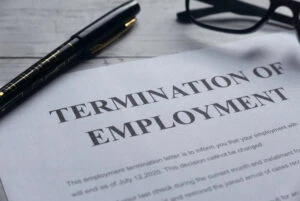
Yes, you can sue Amazon for wrongful termination if you were fired for an illegal reason, such as discrimination, retaliation, or reporting safety violations. However, success depends on proving your termination violated specific employment laws.
Your employment rights matter, and you can work with an Amazon labor and employment lawyer in Boston if you feel like yours were broken. Explore your legal options and what constitutes wrongful termination in Massachusetts by speaking with one as soon as possible after you’ve been terminated.
What Qualifies as Wrongful Termination?
Massachusetts follows at-will employment laws, meaning Amazon can terminate employees for any legal reason. However, certain terminations are illegal under state and federal law, including firing based on protected characteristics or protected activities. This is called wrongful termination.
Protected characteristics include your race, color, national origin, religion, sex, age, disability, genetic information, sexual orientation, and gender identity. If Amazon fired you because of any of these factors, you may have grounds for a wrongful termination lawsuit.
Termination in response to protected activities is also illegal. These activities include filing workplace complaints, participating in investigations, requesting accommodations, or reporting safety violations. This protection falls under various laws, including Massachusetts General Laws Chapter 151B and federal statutes.
Common Examples of Wrongful Termination
Some employees face termination after reporting workplace safety violations to OSHA or state authorities. The Massachusetts Whistleblower Protection Act specifically protects employees who report dangerous working conditions.
Retaliation for supporting coworkers’ discrimination complaints can involve wrongful termination. Under state and federal law, participating in workplace investigations is a protected activity, even if you weren’t the original complainant.
Workers who request reasonable accommodations for disabilities or religious practices are also protected. If Amazon terminates you shortly after such requests, this timing may support a wrongful termination claim.
For a free legal consultation, call (860) 999-9394
How Do I Prove Wrongful Termination?
Documentation is fundamental to these cases. Save all emails, messages, performance reviews, and other communications related to your employment and termination. Massachusetts law allows you to request your personnel file within five business days of termination.
The timeline around your firing can be critical evidence. If your termination followed shortly after engaging in protected activity, this may help prove you were fired for things you’re protected to do under the law.
We recommend keeping a detailed timeline of events leading to your termination. Note any witnesses to discriminatory comments or unfair treatment. A labor lawyer can also give you advice specific to your situation.
What Compensation Can I Recover?
Massachusetts law provides robust remedies for wrongful termination victims. Depending on your circumstances, you may be entitled to several forms of financial compensation. You can receive this compensation by suing Amazon for wrongful termination.
Back pay covers lost wages from your termination date until the resolution of your case. Massachusetts law allows for up to triple damages in certain employment cases, significantly increasing potential compensation.
You may also receive front pay for future lost earnings, emotional distress damages, and compensation for lost benefits. Under the Massachusetts Wage Act, successful plaintiffs can also recover reasonable attorney’s fees and costs.
Click to contact our labor & employment lawyers today
What If I Signed an Agreement with Amazon?
Arbitration agreements may require resolving disputes through private arbitration rather than court. However, these agreements don’t prevent you from filing discrimination charges with the MCAD or EEOC. Massachusetts courts also scrutinize the fairness of arbitration agreements.
Non-disclosure agreements (NDAs) typically protect Amazon’s confidential information but don’t prevent you from filing discrimination claims or reporting illegal conduct. The Massachusetts Wage Act explicitly protects your right to discuss wages despite NDAs.
Amazon may also offer severance pay in exchange for waiving your right to sue. Under the Older Workers Benefit Protection Act, if you’re over 40, you have 21 days to consider a severance agreement and 7 days to revoke after signing. Never sign such agreements without legal review.
Complete a Free Case Evaluation form now
Can I Still Work While Pursuing a Case?
Massachusetts law requires you to make reasonable efforts to find new employment while pursuing a wrongful termination case. This concept is called mitigation of damages.
You can and should seek new employment during your case. Your job search efforts demonstrate good faith and may strengthen your position. Keep detailed records of all applications, interviews, and responses from potential employers.
Unemployment benefits are typically available while your case proceeds. Filing for unemployment won’t hurt your wrongful termination claim. The determination from your unemployment hearing may provide helpful evidence for your case.
Impact on Your Case
Your new employment earnings will be subtracted from any back pay award you receive. However, finding a new job doesn’t prevent you from pursuing emotional distress damages or other compensation.
If you find a lower-paying job, you may still recover the difference in wages from Amazon. Under Massachusetts law, you can seek these differential damages even after starting new employment.
What Are the Time Limits for Filing a Claim?
Don’t delay in pursuing your rights. Massachusetts has strict deadlines for employment claims, known as statutes of limitations.
You must file a complaint with the Massachusetts Commission Against Discrimination (MCAD) within 300 days of the discriminatory act. Federal claims require filing with the Equal Employment Opportunity Commission (EEOC) within similar timeframes.
Missing these deadlines can bar your claims permanently. We recommend consulting with employment attorneys well before these deadlines to ensure you keep them. Starting early will give your attorney more time to investigate and negotiate.
How We Can Help You Sue Amazon for Wrongful Termination
At Duddy, Goodwin & Pollard, we understand the challenges facing a corporate giant like Amazon. We bring extensive knowledge of Massachusetts and federal employment law to your case and are confident in our ability to help you sue Amazon for wrongful termination.
Contact our legal team today for a confidential consultation about your situation. You don’t have to face Amazon alone – we’re here to protect your rights and fight for the justice you deserve.
Call or text (860) 999-9394 or complete a Free Case Evaluation form


